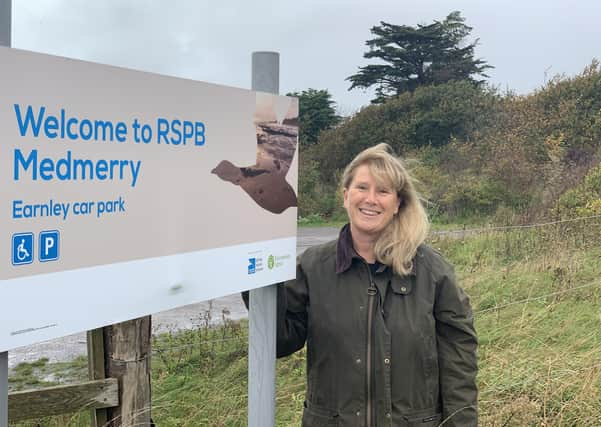Manhood Peninsula campaigner makes BBC Woman’s Hour Power List 2020


This year it celebrates 30 inspiring women making a significant contribution to the environment and the sustainability of the planet.
Among them is Carolyn Cobbold, who lives in Somerley and is co-founder of the Manhood Peninsula Partnership (MPP), due to her contribution towards the creation of the Medmerry Nature Reserve between Selsey and Bracklesham.
Advertisement
Hide AdAdvertisement
Hide AdAlthough ‘delighted and honoured’ to have been selected for the list, Carolyn said: “This is a recognition for all the residents and groups which belong to the Manhood Peninsula Partnership and the years of effort that has been put in by so many people.”
Back in 2000, concerned about the impact climate change would have on the low-lying coastal plan, she and friend Renee Santema persuaded a group of leading Dutch planners, coastal engineers and ecologists to visit the peninsula and suggest long-term solutions.
They came, free of charge, and stayed for a week sleeping in bunk beds in Earnley Concourse and working until late at night every night.
Their advice was to form a partnership, work together, think in an integrated and long term way, and most controversially, let the sea in where possible.
Advertisement
Hide AdAdvertisement
Hide AdLeading on from their work, Carolyn formed the MPP in 2001 with coastal engineer Brian Waters.
The result, more than a decade later, was Medmerry, Europe’s largest coastal realignment scheme. As well as managing flood risk it provides a transitional coastal habitat for wildlife.
The MPP partners include representatives from Chichester District Council and West Sussex County Council, organisations such as Chichester Harbour Conservancy, the Royal Society for the Protection of Birds, the Environment Agency, the National Trust as well as the Manhood Wildlife and Heritage Group and residents.
As well as improving drainage on the peninsula and linking it more effectively to the environment, project work has helped create a network of cycle paths, produced a green tourism strategy and increased awareness of climate change and its likely impact.
But according to Carolyn there is still more to do.
Advertisement
Hide AdAdvertisement
Hide AdShe described how the peninsula and the rest of Chichester’s low lying coastal plain is facing a ‘pincer-like threat’ of rising sea levels, coastal squeeze and increased flood risk combined with ‘unrealistic’ housing quotas imposed by central government.
They also need to persuade planners and politicians that climate change and flood risk is real and increasing and these threats should be included more robustly in planning policies.
Carolyn added: “We also need to enhance and reinforce the natural habitats and biodiversity of our coastal plain including our vital wetlands as working with nature is the best way to make our homes, environment and economy more resilient to climate change and increased flood risk. Chichester’s peninsula and coastal plain is the last remaining rural stretch of coastal hinterland between Southampton and Brighton and should be viewed as an ecological and environmental asset for our local communities and regionally.
“It is encouraging to see that the Chichester Observer is now supporting the efforts being made by organisations such as the MPP, SOSCA, Chichester Harbour Trust and the Conservancy to ensure that the special environment of the peninsula and the rest of the coastal plain, and its role in climate change mitigation is better recognised and appreciated for the benefit of future generations.”
For more on the MPP visit peninsulapartnership.org.uk